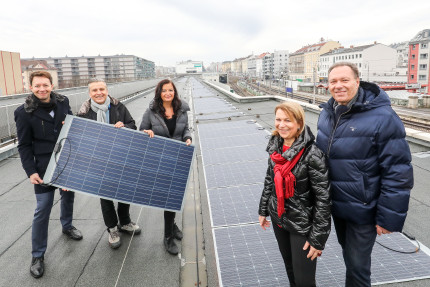Première: Solar power from PV films lights up underground station
Première: Solar power from PV films lights up underground station
A Wiener Linien pilot project with Wien Energie to promote active climate protection in Ottakring
As part of its environmental efforts, Wiener Linien launched a unique pilot project: The first-time installation of special photovoltaic films, on the roof of the underground station in the Ottakring district. The power generated will be used on-site to operate lighting, escalators and elevators. The films are five times lighter than conventional photovoltaic systems and have been installed on the flat roof of the Ottakring U3 station as a pilot project. “Public transport is one of the key factors when it comes to environmental protection in Vienna. Not only trams, buses and underground trains but also the supply of energy to Wiener Linien plays an important role here, which is why I am delighted that Wiener Linien is also acting as a pioneer in this area by testing photovoltaic films on large roof areas alongside Wien Energie”, says Ulli Sima, the city councillor responsible for public transport.
360 square metres of solar power
The project is being implemented by Wien Energie. “Photovoltaic technology continues to develop rapidly. Wien Energie already has systems in place with double-sided, vertically-mounted and semi-transparent modules. The special film-based modules here on the roof of the Ottakring underground station are a first. Due to being particularly light and flexible, they are compatible with the on-site requirements in terms of lightning protection and structural engineering. We are relying on innovative technology to further promote the expansion of photovoltaics in the heart of the city”, according to Karl Gruber, one of the general managers of Wien Energie. The photovoltaic system covers an area of around 360 square metres and generates around 62,000 kilowatt hours of solar power with an output of 60.3 kilowatt-peak. This means that over 21 tonnes of CO2 will be saved every year.
Public transport as a top energy saver
“Public transport is the essential backbone of our efforts to achieve climate goals. Wiener Linien constantly invests in the operation and expansion of its public transport networks. We also make consistent progress in the area of energy efficiency. Solar power is not only good for the climate. As we all know, the sun doesn’t issue invoices”, says Alexandra Reinagl, CFO of Wiener Linien. Regardless of whether trams or underground trains, nearly all Wiener Linien vehicles are already small “power stations”: the energy released when applying the brakes flows back into the DC grid, making it available to other vehicles in the area when they accelerate. In the case of trams, this already equates to 30% of energy needs.

EU supports energy-saving public transport projects
Wiener Linien is one of twelve partners from seven EU member states involved in the EfficienCE international project. That is why the data collected over the next two years from the PV foils will be carefully analysed. The project partners are transport operators, universities, mobility experts and city administrations. The aim is to dramatically reduce the CO2 emissions of mobility providers in European cities. When the project concludes in 2022, recommendations will be formulated on how emissions from public transport can be reduced by 60 percent by 2050. The project is receiving two million Euro in funding from the EU under the Interreg CENTRAL EUROPE programme (https://www.interreg-central.eu/Content.Node/EfficienCE.html).
EU project – facts and figures
12 partners
7 member states
€2m in EU funding for all projects
29 projects
Duration: 2019 to 2022
Project partners:
City of Leipzig, Leipzig Transport Company, Wiener Linien, Gdynia Transport Trolleybus Company, Gdansk University of Technology, City of Maribor, University of Maribor, Pilsen City Public Transport Company, Municipality of Bergamo, Redmint, Mobilissimus and BKK Centre for Budapest Transport
Contact in case of inquiries:
Wiener Linien
Communication
Tel. +43 (0)1 7909 - 17002
